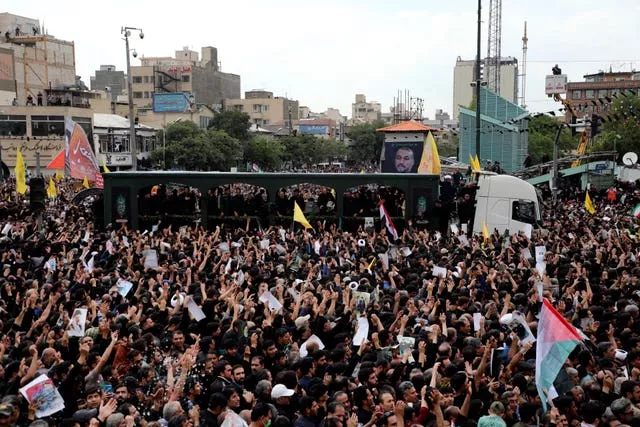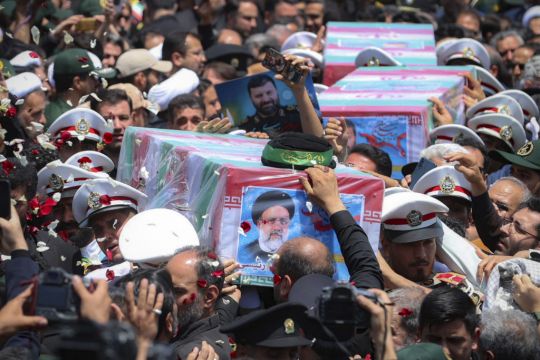Iran interred late president Ebrahim Raisi at the holiest Shiite shrine in the nation on Thursday, days after a fatal helicopter crash killed him along with the country’s foreign minister and six others.
Mourners lowered Mr Raisi’s remains into a tomb at the Imam Reza Shrine in Mashhad, where Shiite Islam’s eighth imam is buried and millions of pilgrims visit each year.
Hundreds of thousands of people dressed in black crowded around the shrine under its golden dome.
The days of services have not drawn the same crowds in the nation of more than 80 million people as those that gathered for services for Revolutionary Guard General Qassem Soleimani in 2020, killed by a US drone strike in Baghdad.

It is a potential sign of the public’s feelings about Mr Raisi’s presidency during which the government harshly cracked down on all dissent during protests over the 2022 death of Mahsa Amini, detained for allegedly not wearing her mandatory headscarf to authorities’ liking.
That crackdown, as well as Iran’s struggling economy, have gone unmentioned in the hours of coverage provided by state television and in newspapers. Never discussed was Mr Raisi’s involvement in the mass execution of an estimated 5,000 dissidents at the end of the Iran-Iraq war. Nor has there been any information about the cause of the crash of the aging Bell helicopter carrying him and others through a foggy, mountainous region.
Prosecutors have warned people against showing any public signs of celebrating Mr Raisi’s death and a heavy security force presence has been seen in Tehran since the crash.
Mr Raisi, who was 63, had been discussed as a possible successor to Iran’s supreme leader Ayatollah Ali Khamenei. Iran has set June 28th as the next presidential election. For now, there is no clear favourite for the position among Iran’s political elite — particularly no one who is a Shiite cleric, like Mr Raisi.
Acting President Mohammad Mokhber has stepped into his role and even attended a meeting between Ayatollah Khamenei and Hamas leader Ismail Haniyeh on Wednesday.
Mr Raisi is the first top politician in the country to be buried at the shrine, which represents a major honour for the cleric. His father-in-law serves as the city’s Friday prayer leader.
The deaths of Mr Raisi and foreign minister Hossein Amirabdollahian come as Iran continues to back militia groups in the wider Middle East to pressure its enemies, namely Israel and the United States. Mourners have chanted against both nations in the ceremonies.
State media circulated photos on Thursday showing a meeting between Iran’s paramilitary Revolutionary Guard chief and the head of its expeditionary Quds Force and representatives from Hamas, Lebanon’s Hezbollah and Yemen’s Houthi rebels.

On Thursday morning, thousands in black gathered along a main boulevard in the city of Birjand, where Mr Raisi once served as its member on the Assembly of Experts in Iran’s South Khorasan province along the Afghan border. There and in Mashhad, mourners on the streets reached out to a truck carrying his casket, with some tossing scarves and other items against it for a blessing.
Meanwhile, former foreign ministers Mohammed Javad Zarif and Ali Akbar Salehi and other dignitaries paid respects to Mr Amirabdollahian at Iran’s Foreign Ministry, where his casket was put on display. His body was later interred in Shahr-e Rey just outside of Tehran at the Abdol Azim shrine, another final resting place for those famed in Persian history.
“Give Soleimani our greetings,” a religious singer said as Mr Amirabdollahian’s body was placed inside its final resting place.







